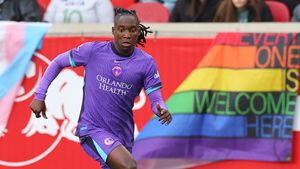In 1994, Kevin
Jennings left his teaching career to establish the Gay,
Lesbian and Straight Education Network and become its
executive director. Two and a half years into his
tenure, the president of GLSEN's board of
directors asked the Harvard graduate if he would be willing
to go back to school for his master of business
administration, better known as an MBA. He enrolled at
New York University and graduated in 1999.
Jennings is one
of the few executive directors of a national gay rights
group with an MBA -- others have law degrees or worked their
way up without an advanced degree. It's a
degree he sees as integral to the success of the gay
rights movement.
"Progressives in general tend to make the mistake of
thinking that we're going to win because we're
right," Jennings says. "That really isn't how
that works. Organization and persistence is incredibly
important, almost as important as motivation and
passion. I was trying to build an organization that
could convert people's passion into concrete
improvements. Going into the training of an MBA was very
helpful for that."
The early
founders of gay rights organizations gave the world an
incredible gift, says Jennings, by establishing their
organizations and building them into complex,
big-budget operations of human activism. But the
future of activism requires a new skill set.
"We've
built them, but now we need people who will know how to run
them," he says. "Of course, they still
need passion. If they didn't have passion, they would
be working somewhere like Goldman Sachs. God knows
they aren't working at some of these places because of the
money."
Coming Out Corporate
Brian Richardson,
a student at the University of California, Berkeley's
Haas School of Business, had apprehensions about entering
his MBA program. "I feared the worst from the
business world, especially toward LGBT people,"
he explains. "But I could not have been more
surprised about how welcoming and affirming the
community is -- not just Haas but business schools
around the country."
Richardson became
familiar with other business schools this year when a
group of LGBT business students from Haas and
Stanford's Graduate School of Business
organized the annual Reaching Out LGBT MBA Conference in
October 2007 to connect MBA candidates and potential
employers.
Ten years ago the
conference was a small affair, attracting 30 students
and three companies. But this year there were "almost
900 people and 80 companies," says Richardson.
"We wanted to have even more companies, but we
ran out of space at the hotel. Everyone wants a piece of
that pie."
Richardson
started out in 2001 as a high school geography teacher for
Teach for America in New Orleans. Two years later he went to
Washington, D.C., to work in politics, became a
spokesperson for the Democratic National Committee
during the 2004 presidential election, and then went
on to work for Louisiana U.S. senator Mary Landrieu. Now he
intends to use his MBA to make an impact not in the
boardroom but back in government.
"I felt
like Washington was filled with people who wanted to do good
but who had no management experience or
skills," he says. "So I thought I'd go
back and see what I could find from an MBA program and try
to translate that into the public sector."
Victor Eng, a
sophomore at the Wharton School of Business at the
University of Pennsylvania, wasn't out when he first came to
school. He didn't want his sexual orientation to
conflict with his education or his future career in
financial services, so he kept mum on the subject. As he
puts it, "business isn't really a super-gay
profession." Eventually a friend convinced him
to attend Out for Undergraduate Business Conference,
similar to Reaching Out MBA but for undergraduate students.
"It
changed my life," says Eng. "It opened my eyes
to the reality of things and how Wall Street,
investment banks, and firms are really reaching out
and targeting gay people. From there I wanted to convey that
message back to the business school for the people who were
like me."
Going to the
conference encouraged him to join the Wharton Alliance for
undergraduate business students, the only undergraduate
preprofessional organization dedicated to gender and
sexuality minorities, according to its website. A year
later he is now president of the two-year-old group.
Eng says that his involvement with the Wharton Alliance has
encouraged him to be out and active in his life and
work.
"I would
much rather choose an LGBT-friendly firm than one
that's unfriendly or even one that's
neutral about it," he says. Even better would
be a place in a proactive firm with already established LGBT
practices and programs. And Eng has a good chance of finding
that perfect company to work for. Opportunities for
LGBT business students looking for work in
gay-friendly companies are staggering compared to just a
decade ago.
In 2002 only 13
of the nation's most powerful companies received a
100 score from Human Rights Campaign's annual
Corporate Equality Index, awarded for providing
programs like domestic-partnership benefits and
companywide gay groups. This year 195 of the companies
scored 100, with many others scoring nearly as high.
Furthermore, 32 banking and financial service
companies attained a perfect score, the highest of any
industry in the study.
This explains why
conferences like Out for Undergraduate Business and
Reaching Out MBA are teeming with companies looking to
introduce themselves to LGBT students. Jennings calls
these conferences a "pipeline for
talent" where he can network for future employees and
volunteers for GLSEN.
One such prospect
is Ganesh Rao, an MBA student at Northwestern
University's Kellogg School of Business who is also
copresident of the 15-year-old Gay and Lesbian
Management Association. He and his counterpart, Pete
Vujasin, head up an active group; thirty of their
members attended Reaching Out last fall. While Ganesh did
garner a contact at Amazon.com, where he is scheduled
to begin working after graduation this spring, he says
the event's greatest draw for him is the
camaraderie.
That's
something Rao and Vujasin replicate in their own
organization. GLMA's great strides in tolerance
and inclusion on campus led to an invitation to
participate in the Reaching Out conference's
inaugural LGBT Leadership Summit. Scheduled for April
26, it's intended to introduce LGBT student
leaders to one another.
The summit,
explains Vujasin via e-mail, is an "opportunity to
increase coordination and communication among business
school LGBT groups and improve the business school
environment for LGBT students."
Kellogg's
assistant dean and director of admissions, Beth Flye, says
the school's atmosphere cultivates tolerant
business leaders by setting a high standard for its
students. "Schools -- higher education in general
-- tends to be more diverse, generally speaking,"
says Flye, who also serves as adviser to GLMA.
"But I will tell you that there are schools,
just like there are companies out there, that are model
organizations. In my opinion, Kellogg is the model
business school in that regard."
As director of
admissions for Kellogg, Flye has the difficult task of
building a class of 1,310 MBA students from thousands of
applicants per year. Students of all stripes,
including LGBT prospects, are integral slices of the
pie.
"We're
trying to build a class," she says. "Just
imagine a mosaic. Each person we admit is a tile in
the next class. And we're not just putting together an
outstanding class in terms of quality and diversity; we're
also putting together what we hope is going to be a very
stimulating and enriching experience for everyone
coming in. We're trying to mirror how the world really
is by bringing in an interesting, diverse class."
Colleges are
typically petri dishes of social change and tolerance, but
business schools are unique. Most MBA students come to
business school with a few years of work experience
under their belts, which means many of them have
already been exposed to the corporate world. With their
presence in business school, LGBT students are changing the
landscape of education and, ultimately, corporate
America.
For Evan
Horowitz, Harvard Business School's LGBT Student
Association copresident, the existence of his group
not only shapes curricula but the prospective
workplace and defies a few stereotypes along the way.
"On
National Coming Out Day we had hundreds of students wearing
rainbow ribbons and stickers," he says.
"You always assume that a guy who has been in
the Army for 10 years is going to be homophobic. But
he's wearing a rainbow sticker all day."
In a 2002 study
by Stanford MBA alum Jason Larber, of the top 21 American
business schools, 86% had an LGBT group, compared to 50% in
1995. What's more, all of the top schools had
an antidiscrimination policy that covered sexual
orientation. Harvard, Stanford, and Wharton tied for the
most tolerant.
By being out and
active to fellow MBA candidates, LGBT students can make
a lasting mark. A heterosexual student who graduates with
gay cohorts will be more likely to accept tolerance in
the workplace, if not expect it.
Richardson
recalls a social event that a large group of international
students attended. He decided to go with his boyfriend, and
the two were the only openly gay people there.
"The next day my friend came up to me and said,
'Thanks so much for bringing your boyfriend. That was
the first time I ever interacted with gay
people.' He said, 'Growing up in Korea
and the companies I worked for, no one was ever out,'
" remembers Richardson. "He wanted to
ask me how Alberto was doing, but he didn't know what
to call him -- my partner, my boyfriend, or my
spouse."
In response to
that experience, Berkeley's q@Haas -- the business
school's LGBT group -- hosted an event the following
semester to answer those questions, targeted
specifically to international students. Says
Richardson, "There are still people who come to
business school who don't know about gay issues, or
gay rights, or even what words to use."
At Harvard,
Horowitz and the LGBT Student Association are working with
faculty to integrate more case studies, adding LGBT
workplace affairs to racial, gender, and religious
issues. In fact, Jennings says, Harvard instruction
includes a case study about GLSEN, arranged by two board
members who are Wharton and Harvard professors.
Doing Well by Doing Good
After graduation,
when LGBT students enter the work world, their methods
and priorities may be very different from the old
"greed is good" stereotype. Shane
Windmeyer, executive director of Campus Pride, a
national organization for LGBT campus leaders, says
companies benefit from employing young gay workers
because of their innate traits as well as their
acquired skill sets.
"LGBT
advocates throughout their lives have had to be persistent
and patient with what they were trying to accomplish
-- whether that be trying to get a policy passed
through their college or university, or starting a gay
student alliance at their school. Many of our LGBT youth
today as employees have those skills and qualities,"
he says. "I think those pay off, and they're
highly sought qualities to have in workers."
While many choose
to apply their professional degree to finance, banking,
consulting, and other business avenues, others use their
leverage to do pro bono work. Rich Carolson works at
the Monitor Group, a Boston-area consulting company
that collaborates closely with GLSEN, helping the
organization spread the message of tolerance in a way that
the average person can understand and empathize with.
Jennings estimated that Monitor's donations to
GLSEN would probably reach into the millions. The
President's Council on Service and Civic
Participation, created by the Bush administration,
honored Monitor in February for its pro bono work over
the last decade.
Alex Goldsmith,
an MBA candidate at the University of Michigan, points to
a high level of gay and lesbian participation in activism
and charity work. "As a community we're focused
on creativity and philanthropy -- if you look at us as
a group, the rates are very high. It's something for
us to be proud of," he says. "Something
that comes across in corporate America is doing more
nonprofit projects and philanthropy."
According to
Funders for Lesbian and Gay Issues, 2005 was the first year
that the top 10 LGBT grant makers awarded $1 million or more
to gay issues, and the number of grants for LGBT
groups shot up 63% between 2002 and 2005.
Jennings
describes the help that GLSEN and other groups receive as
"a fantastic gift. It represents an important
maturing in our movement."
Business school
prepares each MBA candidate to become a power player. And
by bringing their issues to the forefront, gay MBAs help the
LGBT movement to be a bigger power player as well.
"It's not that they end up working
full-time in the movement," says Jennings,
"but they end up leveraging their skills,
really, as volunteers and consultants to
organizations. The same skills would cost us millions of
dollars."

















































































